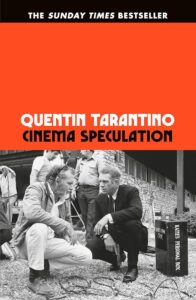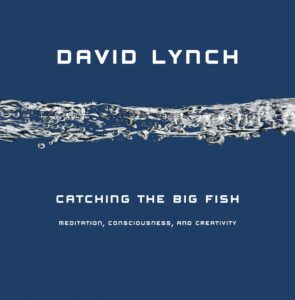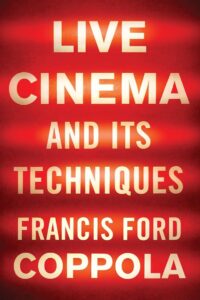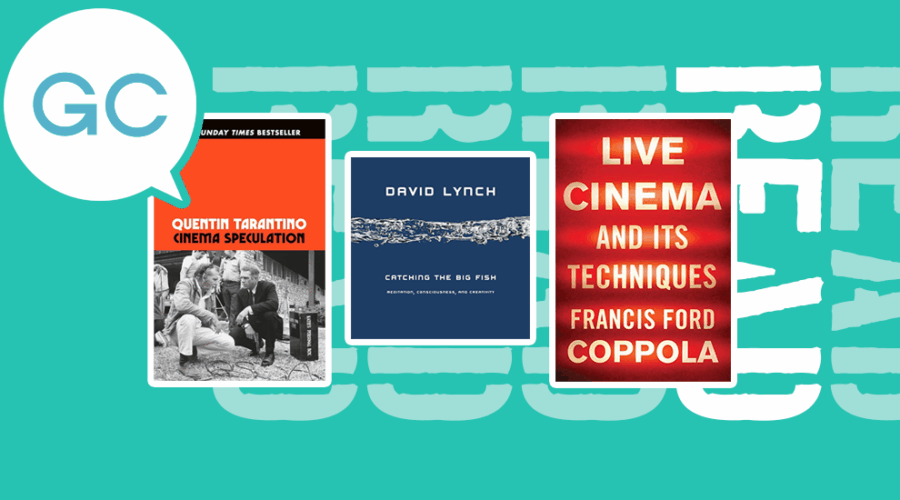There are books that don’t just talk about cinema, they breathe it. Works that draw back the curtain and allow us to witness how images, ideas and obsessions are transformed into art.
Quentin Tarantino, Francis Ford Coppola and David Lynch, each in their own voice, offer more than theory or recollection: they share the raw material of creativity, the restless energy that drives directors when the camera stops rolling and reflection begins.
For cinephiles, artists or anyone fascinated by the mysteries of imagination, this month’s books are not mere companions on the shelf, but sparks that ignite new ways of seeing and creating.
Cinema Speculation, Quentin Tarantino
 Film criticism, Biography
Film criticism, Biography
Published: 2022
Pages: 398
Author’s nationality: USA
This is the intimate portrait of a teenage Tarantino discovering, in the darkness of movie theaters, a universe as wild as it was formative.
More than a survey of film history, the book is a mosaic of memories, analysis and a mirror of American society in the 1970s.
The director unfolds his unique way of reading cinema: passionate, irreverent, with a voice that blends the critic’s erudition with the fan’s enthusiasm. Tarantino writes as someone recalling the first time he felt the vertigo of the big screen, fully aware that this foundational wonder would shape his entire career.
Who’d like this?
This book will especially resonate with lovers of seventies cinema and with those who relish the stories surrounding it: how the films were made, who might have directed them, what they said about their time and why they still echo today. It will also be a feast for anyone who loves hearing Tarantino speak without a filter.
Quotes
“So, if you’re reading this cinema book, hopefully to learn a little something about cinema, and your head is swimming from all the names you don’t recognize, congratulations, you’re learning something.”
“There are very few perfect movies. This is okay, since in the pursuit of cinematic art, perfection shouldn’t be the goal. Nevertheless, when it’s accomplished (even by accident), it’s an achievement.”
Readers say
“Like a lot of famous movie directors, Quentin Tarantino is an absolute movie lover. One thing you learn from this book is that he’s been one since he was a little kid,” says an Amazon user.
“Reading Cinema Speculation is what I imagine sitting down for a conversation with Tarantino must be like,” says an Amazon user.
Catching the Big Fish, David Lynch
 Self-help book
Self-help book
Published: 2006
Pages: 208
Author’s nationality: USA
In this book, Lynch opens a window into his inner world, revealing how Transcendental Meditation became the core of his creative life.
It is not a technical treatise nor a conventional autobiography: it is a collection of brief reflections, where the director of Blue Velvet and Twin Peaks unravels how silence and introspection have allowed him to access the images, atmospheres and visions that define his cinema.
Each fragment reveals as much about his philosophy as about his creative process. Lynch speaks of “big ideas” as fish swimming in the depths of the mind, and of how the practice of meditation helps him descend to that place where they hide.
Who’d like this?
This book will delight Lynch’s followers who seek to understand where his singular narrative universe comes from, but also writers, artists, musicians and creators in general who are curious about the connection between a quiet mind and creative explosion.
Likewise, it will inspire those who approach meditation not only as a practice of wellbeing, but as a tool to unlock the depths of imagination.
Quotes
“Ideas are like fish. If you want to catch little fish, you can stay in the shallow water. But if you want to catch the big fish, you’ve got to go deeper.”
“Don’t fight the darkness. Don’t even worry about the darkness. Turn on the light and the darkness goes. Turn up that light of pure consciousness: Negativity goes.”
Readers say
“This is an insightful, inspiring and motivating book. If you have a creative pull and want to delve into how to tap into it well this book is for you,” says an Amazon user.
“The author is not trying to teach or convince, he just shares his life experiences,” says an Amazon user.
Live Cinema and Its Techniques, Francis Ford Coppola
 Film criticism
Film criticism
Published: 2017
Pages: 211
Author’s nationality: USA
Coppola shares an idea that has obsessed him for decades: the possibility of filming movies as if they were live performances, with the immediacy and vertigo of theater or live television.
More than a manual, it is a creative manifesto where he sets out how this hybrid format could transform cinematic narrative, break free from the rigidity of traditional shooting and open new expressive doors.
Coppola interweaves personal reflections, notes from his experiments and an almost utopian vision of what cinema can become if it dares to mutate.
Who’d like this?
This book will captivate young filmmakers seeking to expand the boundaries of audiovisual language, lovers of technological innovation applied to art, and those who see cinema not only as entertainment but as a laboratory of possibilities.
Readers say
“A pro talks about his craft. Very good information,” says an Amazon user.
“This book is a wonderful look behind the scenes of the filmmaking industry,” says an Amazon user.

